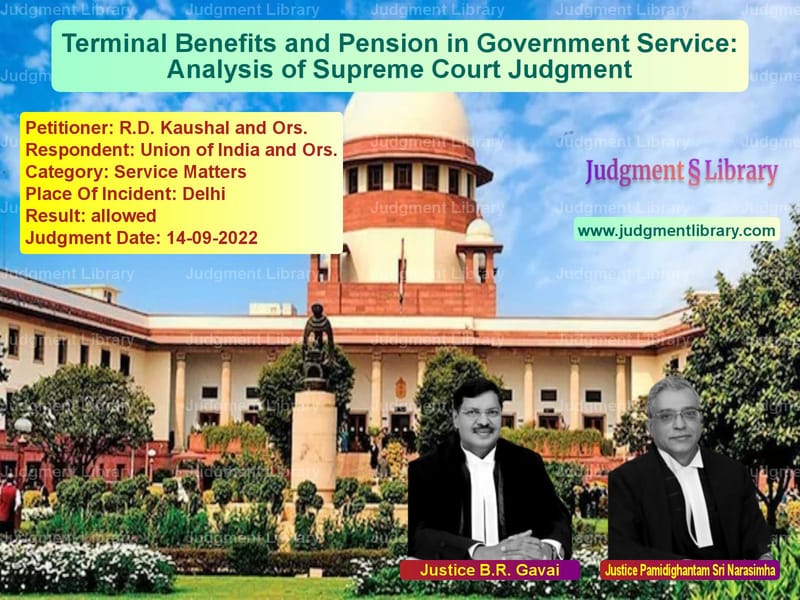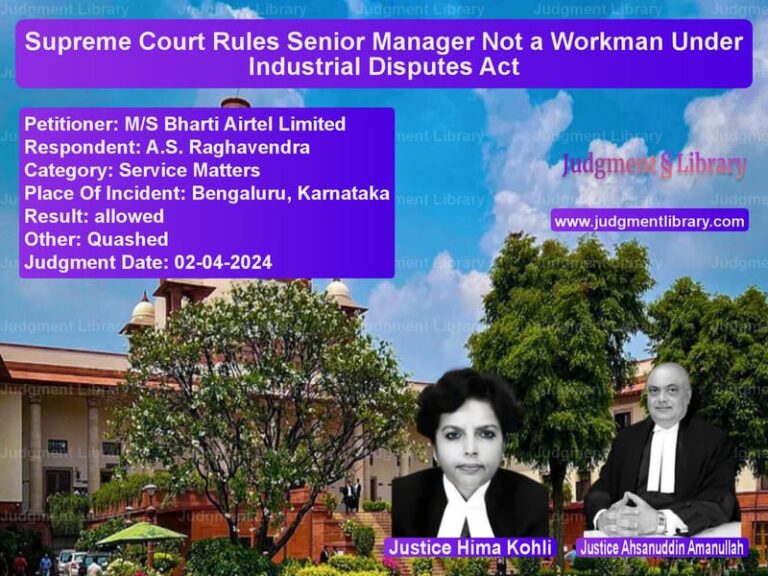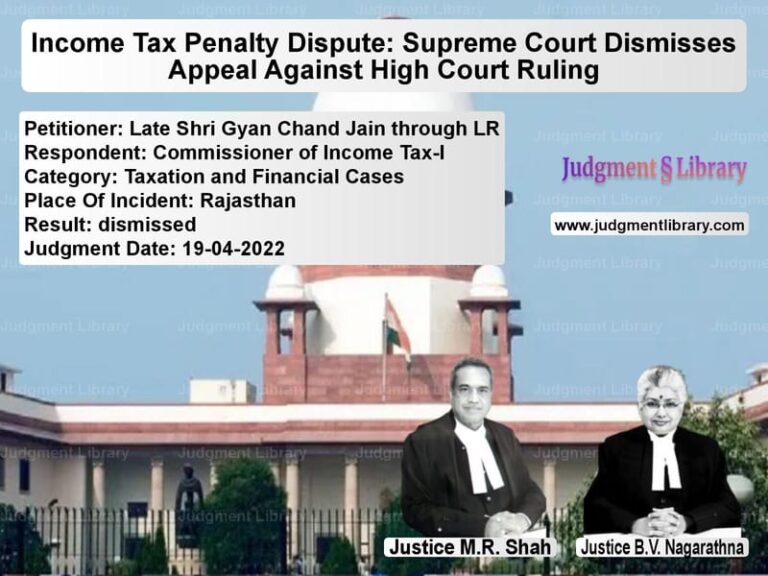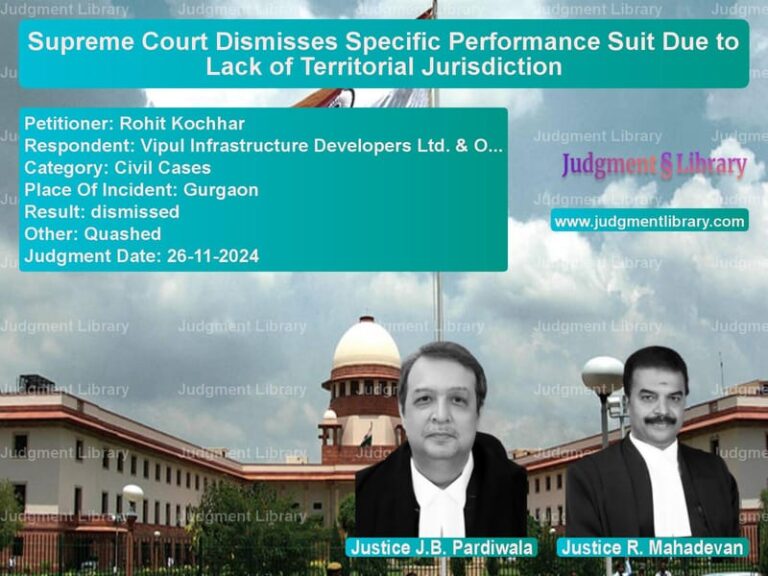Terminal Benefits and Pension in Government Service: Analysis of Supreme Court Judgment
This Supreme Court case involves a legal dispute regarding the promotion, pay scale, and terminal benefits of employees who served in the Language Cadre of the Research and Analysis Wing (R&AW), Cabinet Secretariat, Government of India. The appellants, R.D. Kaushal and others, had initially been recruited as Assistant Foreign Language Examiners (AFLE) and were later promoted to Deputy Foreign Language Examiners (DFLE). The central issue arose after the merger of the AFLE and DFLE posts into a single ‘Senior Interpreter’ position in 2008, and the subsequent impact on their career progression, terminal benefits, and pension entitlements.
The appellants, who had served for several decades, approached the Supreme Court after the High Court of Delhi set aside the Central Administrative Tribunal’s (CAT) ruling, which had granted them certain benefits due to the merger of their positions. The appellants had argued that their rights to terminal benefits and pension should be calculated based on the orders passed by the CAT, while the Union of India contended that the appellants’ claims should not extend beyond the post-merger scenario.
Background of the Dispute
Prior to the implementation of the 5th Central Pay Commission’s recommendations, there existed two distinct posts within the R&AW’s Language Cadre: the Group ‘B’ post of Assistant Foreign Language Examiner (AFLE) and the Group ‘A’ post of Deputy Foreign Language Examiner (DFLE). These posts were revised in 1999 when the pay scale for AFLEs was made equivalent to that of DFLEs. Subsequently, in 1999, the Cabinet Secretariat reclassified the AFLE post as a Group ‘A’ post, making it more aligned with the DFLE position. The next logical step for both AFLEs and DFLEs was promotion to the post of Under Secretary (Language).
In 2001, the Recruitment and Service Rules for R&AW were amended to standardize the residency period for promotion to Under Secretary (Language) to 5 years for both AFLEs and DFLEs. The promotion quota was revised to 60:40 from the earlier 50:50 ratio. However, a critical point arose when, in 2002, the Department of Personnel & Training (DoPT) recommended merging the AFLE and DFLE posts due to vacancies in the Under Secretary (Language) cadre. The recommendation, which was made because of the non-eligibility of DFLEs who had not completed their required residency period, remained unresolved until March 2008 when the Cabinet Secretariat officially merged the posts into a single ‘Senior Interpreter’ post.
Petitioner’s Arguments
The appellants argued that, under the existing rules and policies, both the AFLEs and DFLEs performed the same duties and had identical pay scales. They contended that the merger of the posts into the Senior Interpreter cadre should not have resulted in a loss of benefits or career opportunities, especially considering that the posts had been merged officially without any detrimental impact on the career progression of existing DFLEs. The appellants also pointed out that the merger was effective only in March 2008, but the footnote in the merger notification protected the career interests of the DFLEs until their promotion to Under Secretary (Language). Therefore, the appellants argued that their rights should have been protected in accordance with the earlier directives from the CAT.
Furthermore, the appellants sought the calculation of their terminal benefits and pension based on the orders passed by the learned CAT in 2008 and 2010, which had clearly directed that the two cadres (AFLE and DFLE) should be treated equivalently in terms of pay, benefits, and promotion prospects. The appellants claimed that the failure to implement these directions had led to an unjust situation where they were denied their rightful benefits.
Respondent’s Arguments
The Union of India, represented by the counsel, argued that the CAT had erred in granting retrospective effects to the notification that merged the AFLE and DFLE posts. The Union’s counsel contended that the 2008 footnote in the merger notification made it clear that the merger would not affect the career prospects of the DFLEs, and thus, the appellants were not entitled to the benefits they sought. The Union also emphasized that the decision to merge the posts was based on administrative necessities, such as filling vacancies in the Under Secretary (Language) cadre, and did not imply that AFLEs and DFLEs should be treated identically in all respects after the merger.
Additionally, the Union argued that the appellants were not entitled to arrears of pension, as the changes regarding their positions and promotion were implemented after their superannuation. The Union emphasized that the administrative order of 2008 had been implemented in accordance with the prevailing rules and policies, and the appellants’ claims for retrospective benefits were not legally justified.
Court’s Reasoning
The Supreme Court, in considering the appeals, first examined the facts and the legal framework surrounding the merger of the AFLE and DFLE posts. The Court recognized that both categories of employees performed the same duties, had the same pay scale, and had identical promotional opportunities, which made the merger of the posts reasonable from an administrative perspective. However, the Court also noted that the appellants’ rights to terminal benefits and pension had not been fully accounted for, particularly in light of the previous rulings by the learned CAT.
The Court noted that the order of the CAT in 2008 had attained finality since it had not been challenged by the Union of India. The Court thus held that the appellants were entitled to have their terminal benefits and pension calculated in accordance with the directions issued by the learned CAT in 2008 and 2010. The Court observed that the respondents (Union of India) were bound by these decisions and that the appellants’ claims for pension and terminal benefits should not be denied based on the post-merger situation.
Judgment
The Supreme Court allowed the appeal and directed the respondents to calculate the terminal benefits and pension for the appellants as per the orders of the learned CAT. The Court stated that the terminal benefits should be cleared by 31st December 2022, while the pension would be payable from 1st January 2023 onwards. However, the appellants were not entitled to arrears of pension for the period from their superannuation until the end of 2022. The Court also ruled that the appellants would be entitled to interest at the rate of 6% per annum on their terminal benefits from the date of their superannuation until the payment was made.
Conclusion
The Supreme Court’s judgment highlights the importance of ensuring that employees are treated equitably, especially in situations where administrative changes affect their career progression. The case also reinforces the need for administrative orders to comply with judicial directions, particularly when such orders have been allowed to attain finality. The decision ensures that the appellants receive their rightful dues in terms of terminal benefits and pension while recognizing the legal implications of the earlier rulings by the CAT.
Petitioner Name: R.D. Kaushal and Ors..Respondent Name: Union of India and Ors..Judgment By: Justice B.R. Gavai, Justice Pamidighantam Sri Narasimha.Place Of Incident: Delhi.Judgment Date: 14-09-2022.
Don’t miss out on the full details! Download the complete judgment in PDF format below and gain valuable insights instantly!
Download Judgment: r.d.-kaushal-and-ors-vs-union-of-india-and-o-supreme-court-of-india-judgment-dated-14-09-2022.pdf
Directly Download Judgment: Directly download this Judgment
See all petitions in Employment Disputes
See all petitions in Promotion Cases
See all petitions in Pension and Gratuity
See all petitions in Public Sector Employees
See all petitions in Termination Cases
See all petitions in Judgment by B R Gavai
See all petitions in Judgment by P.S. Narasimha
See all petitions in allowed
See all petitions in supreme court of India judgments September 2022
See all petitions in 2022 judgments
See all posts in Service Matters Category
See all allowed petitions in Service Matters Category
See all Dismissed petitions in Service Matters Category
See all partially allowed petitions in Service Matters Category







